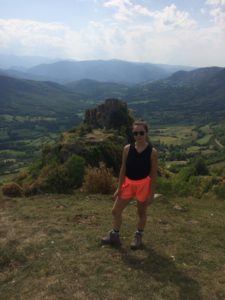Léna Prouchet is a first-year PhD student based in the Environment and Sustainability Institute, Penryn Campus. Her research investigates strategies that could jointly address food insecurity and deforestation in the Peruvian rainforest.
“What on Earth is micro-mentoring?”
These were my first thoughts when I saw the Twitter post of the Exeter Doctoral College offering to book a micro-mentoring session.
Since this word aroused my curiosity, I took some time to elucidate what it meant. I was familiar with mentoring since I took part in such a scheme during my MSc. It was a great experience; I developed a fruitful relationship with my mentor who gave me useful tips and helped me with my PhD applications throughout the year.
But long-term relationships do not characterise “micro-mentoring” sessions. Indeed, the term refers to stand-alone mentoring events. Therefore, I was quite sceptical about the concept since I was not sure I would be able to learn much from a single discussion.
Nonetheless, I decided to give it a try since I felt I really needed some mentoring support at that stage of my research, and especially in relation to this unprecedented context.
Here are some indications on how I tried to best prepare for the meeting. This only comes from my personal experience so if you have any other advice you can share with me, I am happy to read them!
How to book a session?
I emailed researcherdevelopment@exeter.ac.uk to introduce myself and my research topic. I also gave some information about the issues I wanted to address during the mentoring session. This list included: questions on qualitative research methods, advice on how to efficiently plan my research, and tips to adapt to the new online working environment.
A few days later, I was put in contact with a mentor.
How to organize and prepare the meeting?
- I researched the profile of my mentor to understand her research topics and interests.
- I emailed my mentor to introduce myself (tip: you can send the link of your University profile) and briefly explain the topics I wanted to address during the session.
- We exchanged a few emails to arrange a Zoom meeting (in my first email I wrote I was open to any form of exchange – written or oral – and my mentor decided to organise a call).
- I created an agenda for the meeting. Usually, the discussion lasts no more than an hour so it crucial to know exactly what you will ask and in which order (tip: prioritise your questions since you are likely to not be able to ask all of them).
- I sent the agenda to the mentor a few hours before the meeting (if I attend another session, I will send it earlier so the mentor has more time to prepare).
How to make the most out of the discussion with your mentor?
During the session:
After a short introduction, I started asking my first questions. I tried to take as many notes as I could. I was not able to cover all the topics I had planned to talk about since I had many follow-up questions. This does not really matter since I think it is important to adapt to your mentor and to the direction she/he is giving to the call.
Tip: time goes very fast, so keep an eye on your watch!
After the session:
A few hours after the call, I took some time to thank my mentor for her time and precious advice.
The following day, I read and reorganise my meeting notes. During the session, we identified key actions I could implement to tackle the challenges I was facing. From this discussion, I created an action plan with a detailed timeframe.
My “to-do” list includes:
*set journal alerts on relevant research topics
*write my literature review for 30 minutes per day
*read a book recommended by my mentor on qualitative research methods…
Tip: You can organize a follow-up session with your micro-mentor if you feel you need to discuss the progress you made with your action plan.
Would I recommend this experience?
Absolutely! I felt this one-hour call helped me answer questions and doubts I had had for weeks. It is always very helpful to have someone looking at your project with a fresh and watchful eye.
I think my action plan will take a few weeks to complete but I will be willing to renew this experience in the course of my PhD!
Written by: Léna Prouchet
Twitter: @LenaProuchet


